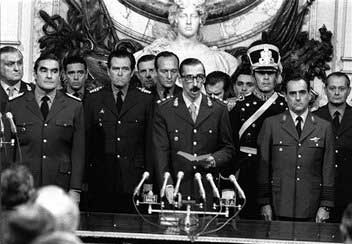
|  |  |  Americas & Beyond Americas & Beyond  
Argentine Coup Leader, Ex-Adm. Emilio Massera Dies
 Debora Rey - Associated Press Debora Rey - Associated Press
go to original
November 08, 2010


| | In this March 24, 1976 file photo, Gen. Jorge Rafael Videla, center, is sworn-in as president at the Buenos Aires Government House accompanied by Adm. Emilio Massera, second from left, and Brig. Orlando Agosti, second from right, members of the junta that overthrew President Isabel Peron. Massera, a leading member of Argentina's former military junta that waged a "dirty war" against political opponents, died Monday Nov. 8, 2010 at age 85. (AP/Eduardo Di Baia) |  |
Buenos Aires, Argentina — Argentine coup leader Emilio Eduardo Massera died Monday after suffering for years from a heart condition and dementia that left him too ill to be tried for crimes against humanity. He was 85.

Massera, a former admiral and member of the military junta that toppled President Isabel Peron in 1976, died at about 4 p.m. Monday, a receptionist at the Navy Hospital confirmed. He said a news conference would be held to reveal the cause of death, and asked for anonymity because he is not allowed to be quoted in the media.

Massera died of a heart attack, according to the local television channels Cronica and C5N. Since suffering a stroke in 2002, he was considered too ill and senile to be prosecuted for stealing the babies of jailed dissidents and other crimes against humanity committed during Argentina's 1976-1983 dictatorship.

Massera, junta President Jorge Videla and other coup leaders took power at a time when Argentina was marked by leftist guerrilla violence and counterattacks by military forces and death squads. Many considered Massera to be the brains behind the junta's "Dirty War" campaign against political opponents, which resulted in nearly 13,000 deaths and disappearances according to official records. Human rights groups put the toll closer to 30,000.

Following Argentina's return to democracy, Massera was condemned in 1985 to life in prison for three killings, the torture of 12 people and the illegal confinement of 69 others, but President Carlos Menem granted him and other coup leaders amnesty in what he called a gesture of reconciliation.

In 2002, the amnesties that kept Massera and Videla from facing new trials were overturned, but Massera's stroke spared him from the multiple trials Videla and other surviving dictatorship figures now face.
|

 |
|  |



